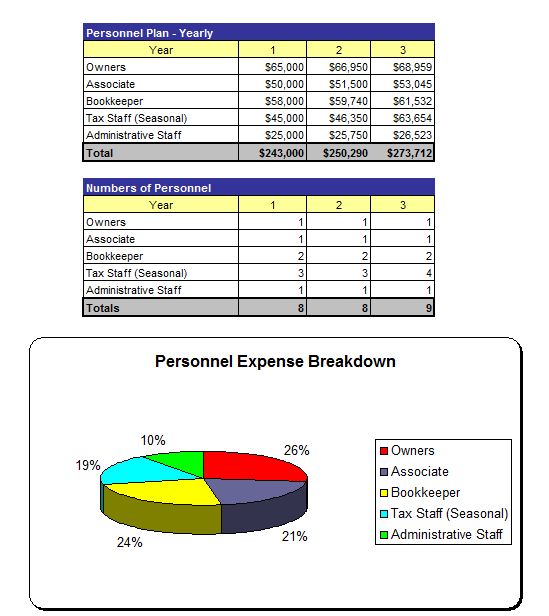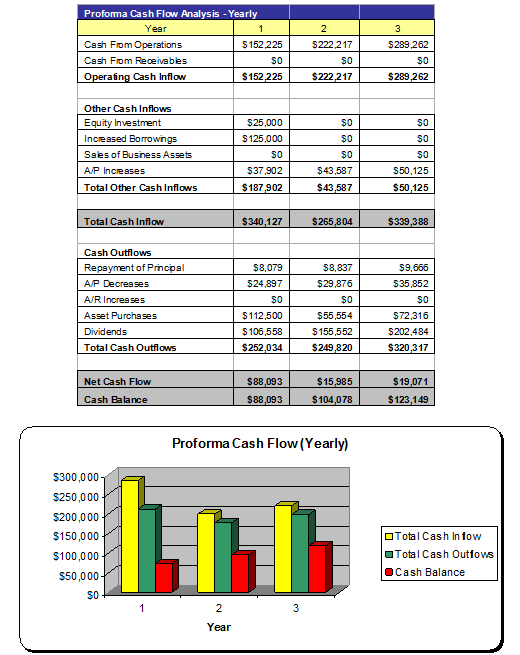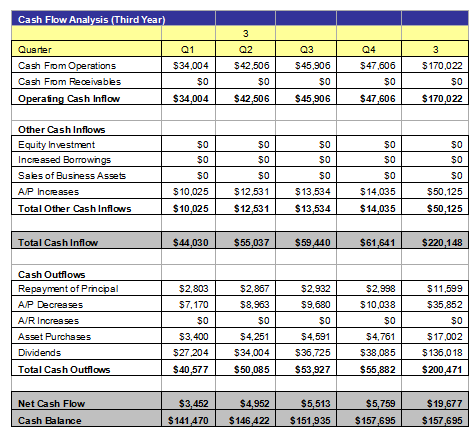Free Title Loan Company Business Plan
For Raising Capital from Investors, Banks, or Grant Companies!
Please note that the financials
in this complete free business plan are completely fictitious and may not
match the text of the business plan below. This free business plan demonstration
purposes only. If you are interested in purchasing the completed editable MS Word
and Excel documents for this business plan, please click the button below! Also,
the text of the business plan is formatted with a fully automated
table of contents.
Return to
Samples Page
It should be noted that there is no special software required to use these
templates. All business plans come in Microsoft Word and Microsoft Excel format.
Each business plan features:
- Excecutive Summary
- Company and Financing Summary
- Products and Services Overview
- Strategic Analysis with current research!
- Marketing Plan
- Personnel Plan
- 3 Year Advanced Financial Plan
- Expanded Financial Plan with Monthly Financials
- Loan Amortization and ROI Tools
- FREE PowerPoint Presentation for Banks, Investors,
or Grant Companies!
1.0 Executive Summary
The purpose of this business plan is to raise $125,000 for the development of a title lender while showcasing the expected financials and operations over the next three years. Title Loan Company, Inc. (“the Company”) is a New York based corporation that will provide short term high interest loans to customers in its targeted market based on the value of their vehicles. The Company will take procession of the title to their vehicle each time an individual wishes to acquire a loan based on the vehicle ownership. The Company was founded in John Doe.
1.1 Products and Services
The Company will provide short term loans to people that are living within the Company’s target market, and which it is authorized to do business based on the value of vehicles that are owned by customers. The market for these products is immensely large among lower income borrowers and the unbanked. Title loans are primarily designed as an emergency credit vehicle for limited usage based on the income of the borrower and the equity that they hold in their vehicles. The Company will use several credit procedural methods to ensure that our high interest rates loans are provided in the ethical manner consistent with all state usury, lending and credit laws. The loans will be secured by the borrower’s vehicle. The third section of the business plan will further describe the services offered by the Title Loan Company.
1.2 The Financing
Mr. Doe is seeking to raise $125,000 from as a bank loan. The interest rate and loan agreement are to be further discussed during negotiation. This business plan assumes that the business will receive a 10 year loan with a 9% fixed interest rate. The financing will be used for the following: • Development of the Company’s retail Title Loan location. • Financing for the first six months of operation. • Capital to finance the Company’s short term title loans that are related to the value of vehicles. Mr. Doe will contribute $25,000 to the venture.
1.3 Mission Statement
Title Loan Company’s mission is to become the recognized leader in its targeted market for providing short term loans and lending services based on the value of vehicles held by their respective owners.
1.4 Mangement Team
The Company was founded by John Doe. Mr. Doe has more than 10 years of experience in the lending and retail management industry. Through his expertise, he will be able to bring the operations of the business to profitability within its first year of operations.
1.5 Sales Forecasts
Mr. Doe expects a strong rate of growth at the start of operations. Below are the expected financials over the next three years.

1.6 Expansion Plan
The Founder expects that the business will aggressively expand during the first three years of operation. Mr. Doe intends to implement marketing campaigns that will effectively target lower income individuals that have established substantial equity within their vehicles within the target market.
2.0 Company and Financing Summary
2.1 Registered Name and Corporate Structure
Title Loan Company, Inc. The Company is registered as a corporation in the State of New York.
2.2 Required Funds
At this time, the Title Loan Company requires $125,000 of debt funds. Below is a breakdown of how these funds will be used:

2.3 Investor Equity
Mr. Doe is not seeking an investment from a third party at this time.
2.4 Management Equity
John Doe owns 100% of the Title Loan Company, Inc.
2.5 Exit Strategy
If the business is very successful, Mr. Doe may seek to sell the business to a third party for a significant earnings multiple. Most likely, the Company will hire a qualified business broker to sell the business on behalf of the Title Loan Company. Based on historical numbers, the business could fetch a sales premium of up to 5 to 7 times earnings.
3.0 Products and Services
Title loans are made for people that need fast access to capital. These loans are secured by the equity of the individual owners’ vehicle/ The Company allows borrowers that have employment for three months at the same location and have an active checking to obtain small two week credit loans that are secured by vehicle ownership. Title Loan Company, Inc. will use the automated clearing house system (or ACH) to ensure that on the date that the loan is due; the business can immediately withdraw funds on the date that the customer is paid. This will ensure that the client does not default on their loan. Customers will not be able to rollover their loans as these creates a tremendous amount of risk for the Title Loan Company. By not allowing customers to roll over on loans, the Company will promote responsible usage of emergency credit lines for customers as it relates to their ownership of vehicles that currently hold a “free and clear title”. Fees for a two week loan will equal 15% to 25% of the borrowed amount. The minimum loan will be $500 and the maximum loan offered by the business will be $1,500. Management has developed the following requirements for a loan from Title Loan Company, Inc.: • Direct Deposit via an active bank accounting • A job that they have held for at least three months • Ownership of a vehicle that has no other liens. • Income of at least $1,000 per month The Company will require the following documentation for a loan: • The Ownership Title to their vehicle • Voided Check • Recent Bank Statement • Pay Stub • State Issued Identification
4.0 Strategic and Market Analysis
4.1 Economic Outlook
This section of the analysis will detail the economic climate, the title loan industry, the customer profile, and the competition that the business will face as it progresses through its business operations. Currently, the economic market condition in the United States is in recession. This slowdown in the economy has also greatly impacted real estate sales, which has halted to historical lows. Many economists expect that this recession will continue until mid-2011, at which point the economy will begin a prolonged recovery period. There are several pieces of legislation that are being considered on both the federal and state level that will sufficiently limit the interest rates charged to low income borrowers for emergency credit services. The payday, title, and signature loan industry generates interest rates of 100% to 600% (on an annual rate) to its customers. These businesses are able to charge these rates of interest as many states do not have upper limits on the interest rates charged on small loans.
4.2 Industry Analysis
In the United States there are over 60,000 businesses that operate as non-depository credit institutions. Among these businesses, an aggregates receipt over each of the last five years has been in excess of $229 billion dollars of interest revenue. These businesses employ over 500,000 people and provide gross annual payrolls in excess of $22 billion dollars. Approximately 5,000 of these businesses operate within a similar capacity as that of the Company. The industry has recently undergone a revolution with the advent of the Internet. With instant access to customer verification, people can seamlessly borrow capital from banks that conduct business on the Internet. This aspect of the industry is expected to grow at a rate of 10% per year for the next five years. The Company intends to capitalize on this trend.
4.3 Customer Profile
The Company will cater to a large audience of lower income people that have limited access to banking services and/or credit. The primary demographics of the people that the Company is targeting include but are not limited to: • Earns less than $30,000 per year • Speaks English or Spanish • Has a bank account (for title signature loans) • Is employed at the same business for the last six months (for loans) • Has clear ownership for their vehicles. Title Loan Company, Inc. is quickly developing its credit manual to develop guidelines regarding its title loan business. The business has already employed several techniques to ensure that credit default is kept to an absolute minimum as it relates to title loans that are granted in regards to free and clear owned vehicles. In regards to the Company’s lending services, the business will require authorization to debit the customer’s account on the day that the loan becomes due on a biweekly basis or other basis which has been established with the customer prior to them engaging the business for a title loan.
4.4 Competitive Analysis
This is one of the sections of the business plan that you must write completely on your own. The key to writing a strong competitive analysis is that you do your research on the local competition. Find out who your competitors are by searching online directories and searching in your local Yellow Pages. If there are a number of competitors in the same industry (meaning that it is not feasible to describe each one) then showcase the number of businesses that compete with you, and why your business will provide customers with service/products that are of better quality or less expensive than your competition.
5.0 Marketing Plan
The Title Loan Company intends to maintain an extensive marketing campaign that will ensure maximum visibility for the business in its targeted market. Below is an overview of the marketing strategies and objectives of the Company.
5.1 Marketing Objectives
-
• Establish relationships with check cashing locations that do not offer vehicle title loan services within the targeted market.
-
• Implement a local campaign with the Company’s targeted market via the use of flyers, local newspaper advertisements, and word of mouth advertising.
-
• Develop an online presence by developing a website and placing the Company’s name and contact information with online directories.
5.2 Marketing Strategies
Mr. Doe intends on using a number of marketing strategies that will allow the Title Loan Company to easily target men and women within the target market. These strategies include traditional print advertisements and ads placed on search engines on the Internet. Below is a description of how the business intends to market its services to the general public. The Title Loan Company will also use an internet based strategy. This is very important as many people seeking local services, such as title lenders, now the Internet to conduct their preliminary searches. Mr. Doe will register the Title Loan Company with online portals so that potential customers can easily reach the business. The Company will also develop its own online website, which may include functionality for allowing customers to directly acquire loans over the internet. The Company will maintain a sizable amount of print and traditional advertising methods within local markets to promote the title loans that the Company is offering. The business will also maintain close connections with traditional lending institutions that will refer their customers to the Title Loan Company for vehicle loans that do not meet their criteria as it pertains to acquiring short terms loans on an ongoing or emergency basis. By developing these relationships with traditional loan sources, the Title Loan Company will be able to generate a substantial amount of additional income through referral leads among small banks and nationally recognized banks that operate within the Company’s target market. Mr. Doe will aggressively pursue these relationships from the onset of business operations.
5.3 Pricing
In this section, describe the pricing of your services and products. You should provide as much information as possible about your pricing as possible in this section. However, if you have hundreds of items, condense your product list categorically. This section of the business plan should not span more than 1 page.
6.0 Organizational Plan and Personnel Summary
6.1 Corporate Organization

6.2 Organizational Budget

6.3 Management Biographies
In this section of the business plan, you should write a two to four paragraph biography
about your work experience, your education, and your skill set. For each owner or
key employee, you should provide a brief biography in this section.
7.0 Financial Plan
7.1 Underlying Assumptions
-
• Title Loan Company, Inc. will have an annual revenue growth rate of 13% per year.
-
• The Owner will acquire $125,000 of debt funds to develop the business.
-
• The loan will have a 10 year term with a 9% interest rate.
7.2 Sensitivity Analysis
The businesses’ revenues are not sensitive to the overall change in the general economic market. Title loans are primarily used as emergency lending vehicles as it relates to vehicle ownership among the Company’s targeted market, and as such, the people obtaining these loans are in a serious financial situation. As such, as the economy recesses the business may actually notice a marked increase in the lending portfolios generated by the Company. However, severe turns in economic stability may increase the defaults experienced by the business as it relates to providing title loans to the general public. Management would compensate this higher risk by increasing the fees associated with each vehicle title loan.
7.3 Source of Funds

7.4 General Assumptions

7.5 Profit and Loss Statements

7.6 Cash Flow Analysis

7.7 Balance Sheet
 .
.
7.8 General Assumptions

7.9 Business Ratios

Expanded Profit and Loss Statements




Expanded Cash Flow Analysis



